
Mu'in al-Din Hasan Chishti Sijzi, known reverentially as Khawaja Gharib Nawaz, was a Persian Islamic scholar and mystic from Sistan, who eventually ended up settling in the Indian subcontinent in the early 13th-century, where he promulgated the Chishtiyya order of Sunni mysticism. This particular Tariqa (order) became the dominant Islamic spiritual order in medieval India. Most of the Indian Sunni saints are Chishti in their affiliation, including Nizamuddin Awliya and Amir Khusrow.
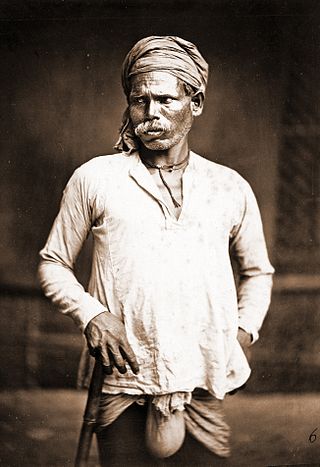
The Dom, also known as Domra, Domba, Domaka, Dombara and Dombari, are castes, or groups, scattered across India. Dom were a caste of drummer. According to Tantra scriptures, the Dom were engaged in the occupations of singing and playing music. Historically, they were considered an untouchable caste called the Dalits and their traditional occupation was the disposal and cremation of dead bodies. They are in the list of Scheduled caste for Reservation in India in the Indian states of Uttar Pradesh, Bihar, Odisha, Andhra Pradesh, Jharkhand and West Bengal.

Mansa district is a district in the state of Punjab, India. The district headquarters is Mansa city. Mansa district was formed on 13 April 1992 from the erst while district of Bathinda. The district has three tehsils: Mansa, Budhlada and Sardulgarh; and five development blocks: Mansa, Budhlada, Sardulgarh, Bhikhi and Jhunir.
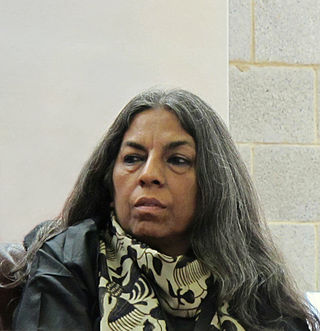
Urvashi Butalia is an Indian feminist writer, publisher and activist. She is known for her work in the women's movement of India, as well as for authoring books such as The Other Side of Silence: Voices from and the Partition of India and Speaking Peace: Women's Voices from Kashmir.
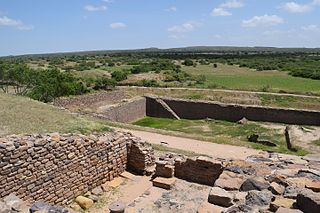
Dholavira is an archaeological site at Khadirbet in Bhachau Taluka of Kutch District, in the state of Gujarat in western India, which has taken its name from a modern-day village 1 kilometre (0.62 mi) south of it. This village is 165 km (103 mi) from Radhanpur. Also known locally as Kotada timba, the site contains ruins of a city of the ancient Indus Valley civilization. Earthquakes have repeatedly affected Dholavira, including a particularly severe one around 2600 BCE.

Ikhtiyār al-Dīn Muḥammad Bakhtiyār Khaljī, also known as Bakhtiyar Khalji, was a Turko-Afghan military general of the Ghurid ruler Muhammad of Ghor, who led the Muslim conquests of the eastern Indian regions of Bengal and parts of Bihar and established himself as their ruler. He was the founder of the Khalji dynasty of Bengal, which ruled Bengal for a short period, from 1203 to 1227 CE.
Rahi Masoom Raza was an Indian Urdu and Hindi poet and writer and a Bollywood lyricist. He won the Filmfare Award for Best Dialogue three times, for his work in Main Tulsi Tere Aangan Ki (1979), Tawaif (1985) and Lamhe (1991). He is best known for writing the screenplay and dialogues for the television series Mahabharat, which was based on the ancient Indian epic, the Mahabharata.
Madrasatul Islah is a traditional Islamic institution of learning and a renowned center of oriental and Islamic studies at Sarai Mir in the Azamgarh district of Uttar Pradesh. It was started by Mawlana Muhammad Shafi in 1908 along with participation of prominent scholars and religious seminaries of the area. The madrassa was established with a different syllabus and ideology than that of Darul Uloom Deoband and Darul Uloom Nadwatul Ulama. Shibli Nomani and Hamiduddin Farahi are regarded as chief architects of this madrasa.

Emily Chang is an American journalist, television host, executive producer, and author. In 2023, she launched a new show with Bloomberg Originals called The Circuit where she interviews influencers in technology, business, entertainment and culture. In addition to a premium show, extended interviews are released in The Circuit podcast. Chang was the anchor and executive producer of Bloomberg Technology for over a decade, a daily TV show focused on global technology, and Studio 1.0, where she regularly spoke with top executives, investors, and entrepreneurs. Chang is the author of Brotopia: Breaking Up the Boys' Club of Silicon Valley, which explores gender inequality in the tech industry.
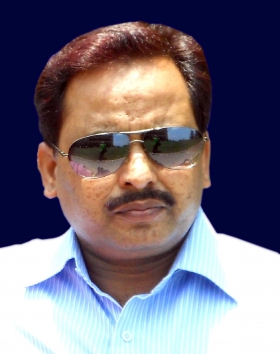
S. R. Chishti is a tabla player of Lucknow gharana (tabla) and composer. S R Chishti completed his PhD from Dr. B. R. Ambedkar University, Agra in music (Tabla).
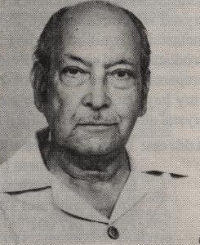
Ram Behari Arora (1917–1997) was an Indian pharmacologist, medical academic, and the founding head of the department of pharmacology at Sawai ManSingh Medical College, the first medical college in the Indian state of Rajasthan. He was one of the founder fellows of the National Academy of Medical Sciences.
Jyoti Arora is an Indian author of several books, including Dream's Sake (2011), Lemon Girl (2014) and You Came Like Hope (2017). She is also a tech blogger.

In 2016 and 2017, there was a significant debate on how topics related to South Asia were represented in California middle school textbooks—a follow-up to a related set of debates that took place from 2005 to 2009. These new debates were fueled by varying religious groups who felt the 2009 changes were incorrect, or pushed political agendas. The California Department of Education runs a public process to update the history and social sciences curriculum frameworks, which help guide the textbooks that publishers develop for students. Starting in 2016, groups submitted textbook revisions dealing with a variety of issues related to histories of South Asia, India, Hinduism, Sikhism, Dalits, Muslims, Ravidassias, the Indus Valley civilization, and the rights of women, as taught in California 6th and 7th grade history and social science textbooks. The Department of Education made final decisions on the topics in 2017, retaining content on the caste system, and referring to all of historical South Asia as India, among many other decisions.

Aanchal Malhotra is an Indian oral historian, author and artist, known for her work on the Partition of India. Her research and writings focus on the oral histories of individuals affected by the Partition, capturing their memories and the tangible remnants of that period.
Shambhudan Gadhvi is a former master clerk and amateur geologist from Gujarat who discovered the Indus valley site of Dholavira in the early 1960s.
Alpa Shah is a British social anthropologist and writer specialising in South Asia. She is Professor of Anthropology at London School of Economics and author of the award-winning Nightmarch: Among India’s Revolutionary Guerrillas, a finalist for the 2019 Orwell Prize for Political Writing. Shah has written for newspapers and magazines in the UK, US and India, including the New Statesman, Foreign Policy, New York Review of Books, The Times of India and Hindustan Times. Shah has also made a radio documentary on ‘India’s Red Belt’ for BBC Radio 4 Crossing Continents, reported for BBC Radio 4's From Our Own Correspondent, and co-curated a major photographic exhibition 'Behind the Indian Boom'.
Tanuj Solanki is an Indian writer who is founder of Bombay Literary Magazine and author of Diwali in Muzaffarnagar, Neon Noon, The Machine is Learning and Manjhi’s Mayhem.
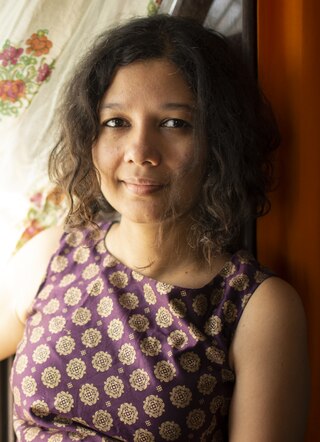
Shubhangi Swarup is an Indian author, journalist and educator. She is best known for her novel Latitudes of Longing, which was published in 2018 by HarperCollins and was declared a bestseller soon after its release in India, and Sweden.

Raziuddin Aquil is an Indian historian, author and professor in the Department of History, University of Delhi. His research interests include religious practices, literary cultures and historical traditions in medieval and early modern India.

Seema Chishti is a journalist and writer from Delhi, India. She is currently one of the editors of the digital news portal The Wire. She was editor for the Hindi and Delhi Bureau head for the BBC and a deputy editor at the Indian daily The New Indian Express. She has also published the book Sumitra and Anees: Tales and Recipes From a Khichdi Family and co-authored Note By Note: The India Story (1947–2017).














